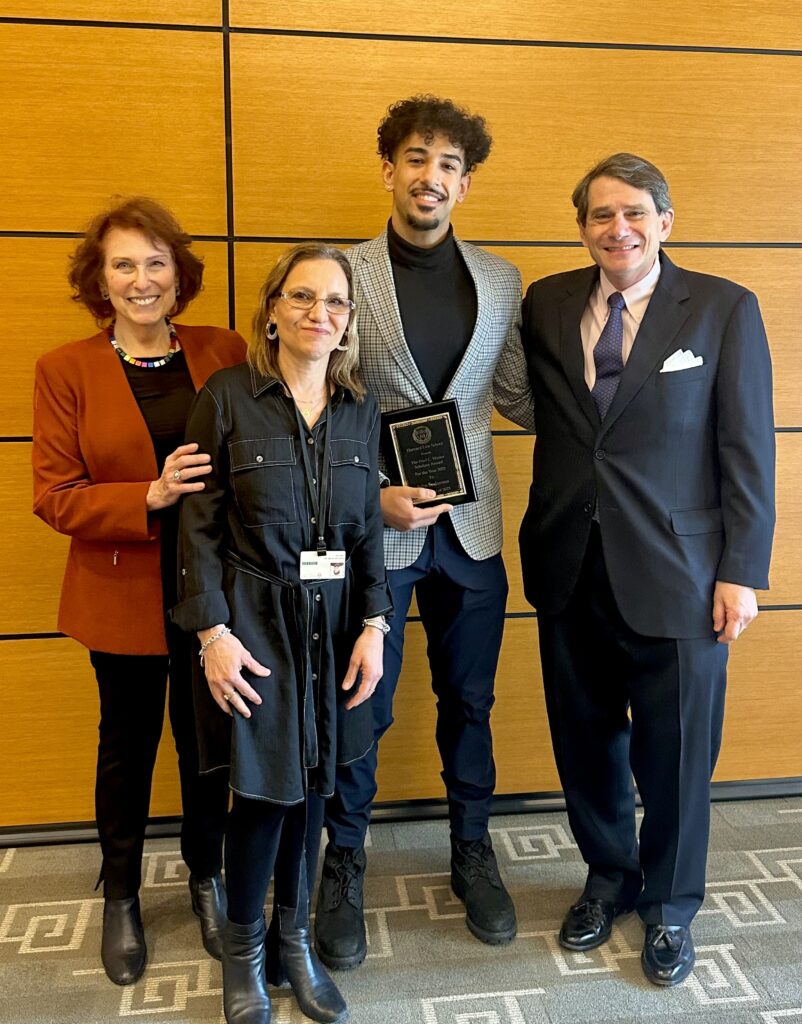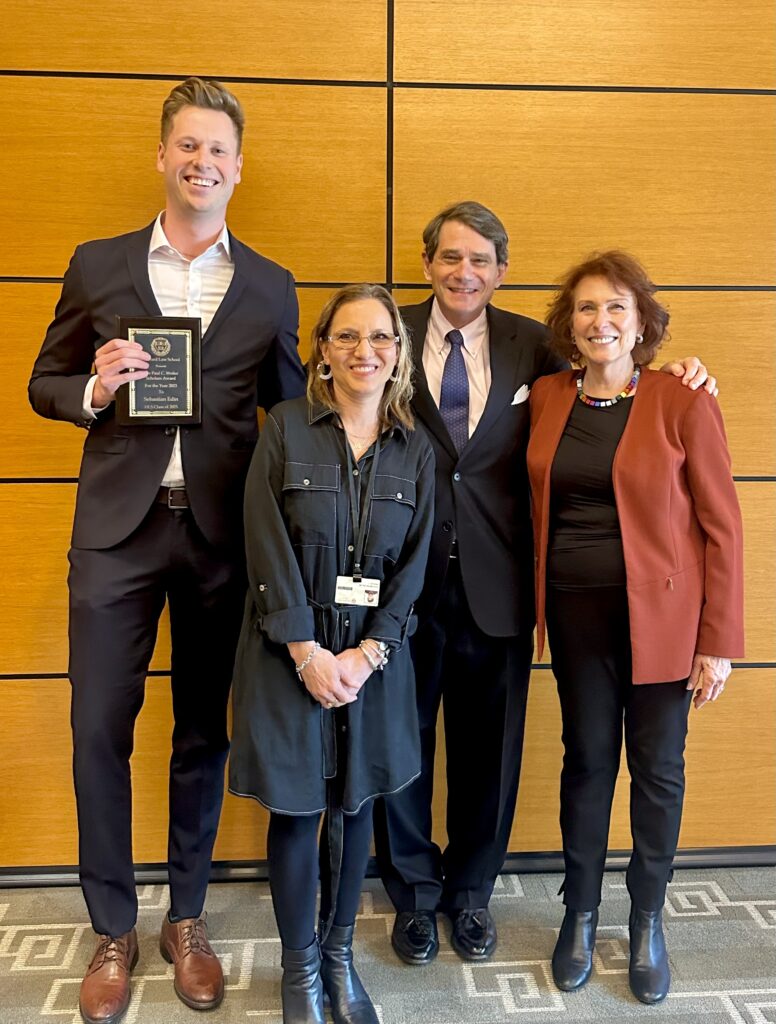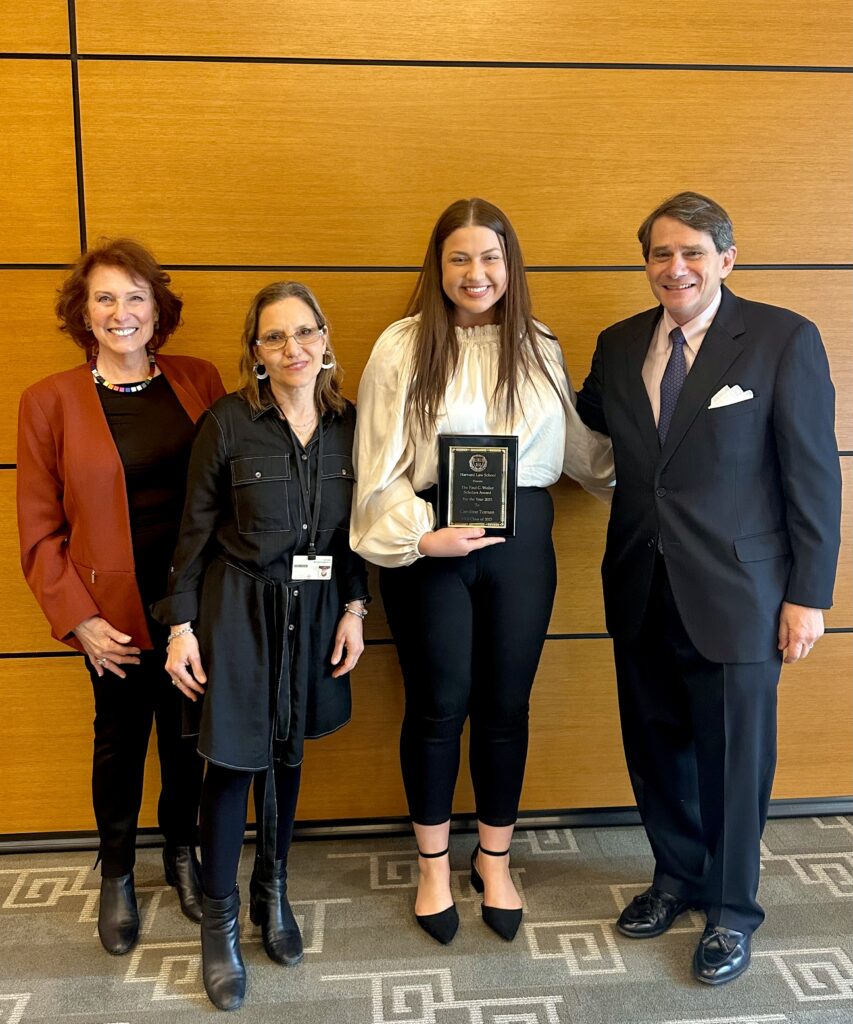On April 11, three clinical students received the 2023 Weiler Awards during the Harvard Committee on Sports & Entertainment Law’s annual Harvard Sports Law Symposium.
The Weiler Awards were established at Harvard Law School in 2008 in tribute to the late Paul C. Weiler, who was a respected American sports law pioneer and a distinguished labor law scholar as the Henry J. Friendly Professor of Law Emeritus at Harvard Law School. After a prolonged illness, Weiler passed away in 2021. Harvard Law School Dean John F. Manning ’85 paid homage to Weiler’s legacy, stating that “Paul represented the best of our profession and of the legal academy.” The Paul C. Weiler Endowed Scholarship Fund supports exceptional sports law students, and this year’s honorees were three students who had previously participated in the Sports Law Clinic: Sebastian Edin, JD ’23, Caroline Toman ’23, and John Sedarous ’23.
We spoke with this year’s Weiler Scholars to learn about their participation in the Sports Law program at HLS and how their clinical placements have influenced their career goals.
Office of Clinical and Pro Bono Programs (OCP): What sparked your interest in taking the Sports Law Clinic?
John Sedarous (JS): I was initially drawn to the sports law clinic because of my passion for both sports and the law. The clinic offered a unique opportunity to combine these passions while working with world-class organizations. I was excited about the prospect of developing my skill set and learning from some of the most talented people in the industry.
Caroline Toman (CT): I come from a huge baseball family. Growing up, my father was a college baseball coach. One of my brothers plays NCAA Division I baseball and the other plays professionally for the Toronto Blue Jays organization. I’ve been around baseball my entire life and knew I wanted to work for a team when I got to HLS.
Sebastian Edin (SE): My main motivation for attending HLS was the school’s terrific sports law curriculum. My goal is to one day work in sports, and the Sports Law Clinic has given me an unmatched opportunity to work with some of the best sports organizations in the U.S.
OCP: Where have your clinical placements been? What type of work did you do during your externship? What did you enjoy about it?
SE: During my time with the Sports Law Clinic, I have worked with the Arizona Coyotes, Boston Celtics, and the Washington Capitals. With the Coyotes and the Celtics, I mostly work on corporate matters. This included a lot of contracts drafting and a variety of research projects. With the Capitals, I worked more on player operations issues, such as salary cap research or writing briefs for player arbitrations.
The most enjoyable part of my experience has been to meet and to work with all of the amazing individuals for each organization. Marina Carpenter and Michael DiGiacomo with the Coyotes, James Parker and Sarah Herlihy Wilson with the Celtics, and Don Fishman with the Capitals, are all great mentors.
JS: Through the Sports Law Clinic, I was fortunate to work with Klutch Sports Group, a high-caliber sports agency that represents some of the biggest names in sports, and the Concussion Legacy Foundation, a nonprofit organization dedicated to studying and preventing concussions in sports. I completed three placements with Klutch and one placement with the Concussion Legacy Foundation.
As the first HLS student to conduct a placement with Klutch, my projects varied based on our clients’ needs. My primary focus was contract drafting and conducting legal research, which provided incredible experience in contract law and negotiations. I also had the opportunity to work on client management and communication, which helped me develop my interpersonal skills and expand my knowledge of the industry.
My placement with the Concussion Legacy Foundation was centered around legal research on concussion protocols and athlete safety. This placement allowed me to explore the intersection of sports and public health while working with field experts to develop strategies for promoting athlete safety and preventing head injuries.
I sincerely enjoyed the opportunity to apply the skills I learned in my classes to solve real-world problems and to work on projects that had a tangible impact on the sports industry. I also appreciated the insider’s perspective that my placements provided, which gave me a better understanding of the dynamic challenges and opportunities currently at the intersection of sports and the law.
CT: I worked for the legal departments of both the Boston Red Sox and the Milwaukee Brewers. In these positions, I drafted all sorts of sponsorship, consulting, event, and intellectual property licensing agreements and conducted miscellaneous legal research for the teams’ executives. I enjoyed drafting entire agreements on my own. In particular, my clinical supervisor and Associate General Counsel for the Milwaukee Brewers, Kellen Kasper, eventually began looping me in on correspondence with the team’s corporate partnership team so that I could ask my own questions about the agreements I was drafting.
I really appreciated Kellen offering me this kind of autonomy and trust. I also had the chance to work for attorneys in the labor relations department of Major League Baseball where I drafted documents related to arbitration hearings and the league’s collective bargaining agreement. Because most of my work for the teams was transactional in nature, I really enjoyed being exposed to the labor side of sports work during my time with the league.
OCP: What were your biggest takeaways from the experiential learning of the Sports Law Clinic?
CT: These clinical experiences offered me exposure to and mentorship from incredibly intelligent and talented sports attorneys. Getting to experience what life is like as an in-house counsel for a major professional sports organization before graduating from law school was truly invaluable.
JS: These placements were unbelievably enriching experiences. They taught me the importance of dedication, attention to detail, effective communication, teamwork, and flexibility in sports law. They also gave me a deeper understanding of the legal and business aspects of the sports industry. Overall, they have helped me develop the skills and knowledge necessary to succeed in such a dynamic field. I will always be grateful for the opportunities the Sports Law Clinic made possible for me.
OCP: What does the Weiler Scholar Award mean to you?
CT: This recognition is a true honor. Harvard Law School’s sports law program, thanks to the legacy and contributions of Paul C. Weiler, has changed the trajectory of my professional career, and for this I could not be more grateful. I simply could not imagine a better place for preparing to practice law in the sports industry than HLS.
SE: Receiving the Weiler Scholar Award for the second time is a great honor. The sports law community at HLS will always have a special place in my heart, and it would not have been possible without Professor Carfagna and Professor Weiler. Thank you very much to Professor Carfagna, Professor Darwin, and the rest of the Weiler family for making the award possible.
JS: Winning the Weiler Scholar Award is an incredible honor. It is a testament to the hard work and dedication I have put into studying and practicing sports law at HLS. It is also a testament to the support I have received from my professors, friends, and family. None of my achievements would be possible without them.
This award is especially meaningful to me because it’s named after a true trailblazer in the sports law world, Professor Paul C. Weiler. To be associated with him is truly humbling. It represents a commitment to excellence and a responsibility to continue contributing to the field.
Filed in: Clinical Student Voices, Events
Tags: Class of 2023, Sports Law Clinic
Contact Office of Clinical and Pro Bono Programs
Website:
hls.harvard.edu/clinics
Email:
clinical@law.harvard.edu


